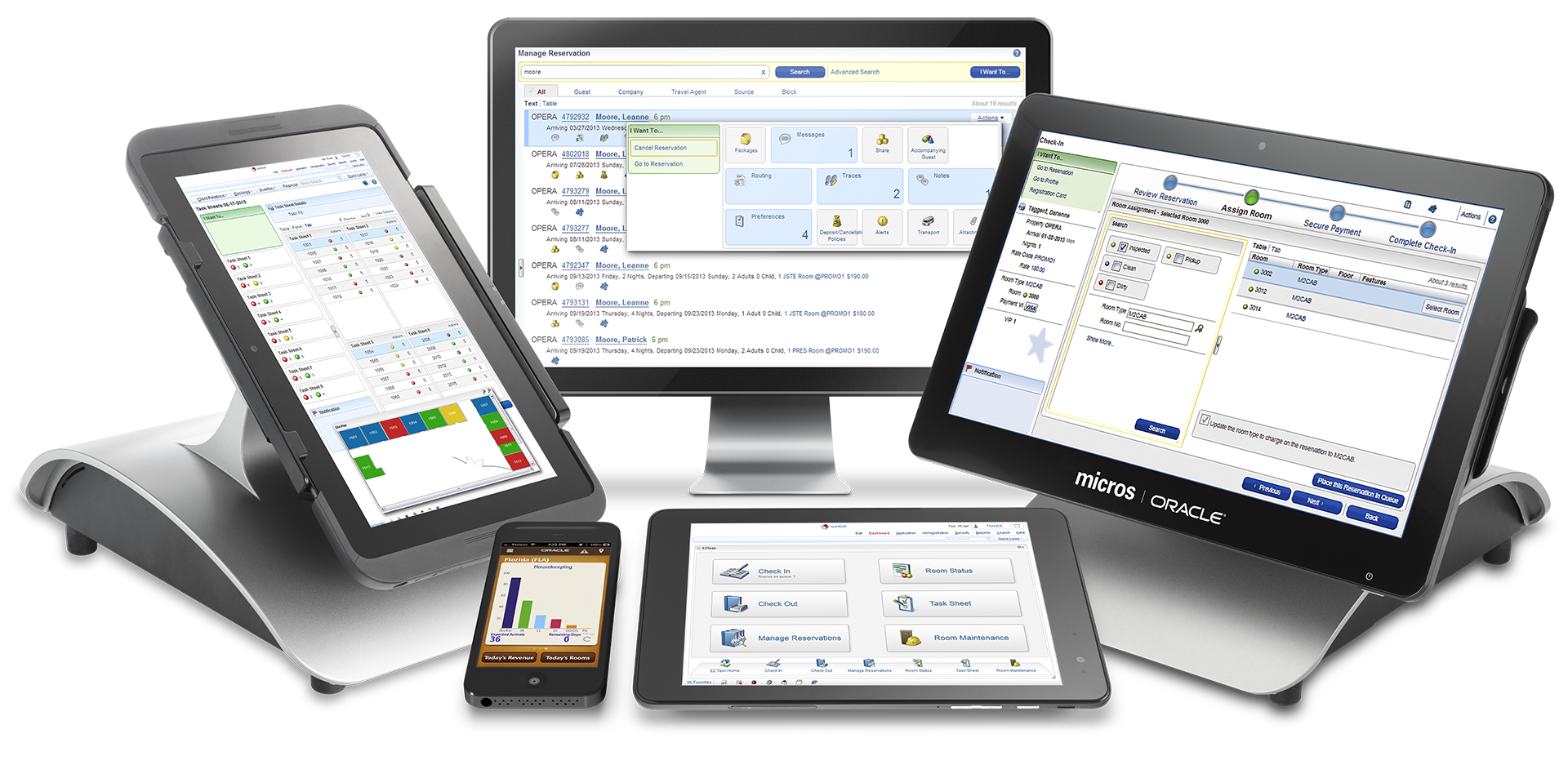A good cloud-based property-management system should be more secure than the typical server-based systems located on property because it is hosted in an environment that is managed by people whose sole job is to keep it secure. “The monitoring and oversight is done by professionals,” said Jos Schaap, CEO and founder of StayNTouch. “There are appropriate firewalls and professionals making sure there are no breaches with spot checks to prevent hacking.”
The level of administration and management is higher for a system that is powering hundreds or thousands of hotel operations, said Charlie Green, SkyTouch’s director of product management.
“A team of professionals are managing the system and monitoring 24/7,” he said. “The systems are generally located in a purpose-built data-center facility that incorporates high levels of physical access security, backup power, backup network access and enhanced air conditioning with air filtration.”
With a purpose built software-as-a-service solution, whether open or closed, security is always taken into account during the development process, said Patrick van der Wardt, SVP international sales of PMS for Amadeus Hospitality. “All systems need to have the ability to talk to one another through open, published APIs in order to have the best user experience across multiple systems and platforms,” he said.
Scalability is a key benefit of the SaaS model. By utilizing services on a subscription model, the user doesn’t need to worry about finding additional server space, hosting, bandwidth, etc. Instead there is a fee for the use of the services, and the services are delivered to the user, van der Wardt said.
“As many services are borne by the provider, who is ultimately responsible for ensuring availability and reliability, costs are definitely more easily accounted,” he said. “A hotel would only pay for the services they use and not for a hosting environment or bandwidth, for example.”
Ultimately, operators need to choose the best technology for their individual properties, said Trisha Littlejohn, director of PMS at Agilysys. While hoteliers shouldn’t expect their service provider to handle their compliance and governance responsibilities, the powerful encryptions most reputable cloud-based solutions use can certainly play a role in streamlining and improving these efforts, she said.
Littlejohn suggested that hoteliers could take some steps to ensure security:
- Take the time to validate the security of cloud providers. Cloud-based data centers should be tested and audited to ensure they meet certain standards (e.g. PCI, HIPPA, COBIT, ITIL, etc.) adopted by the business.
- Consider either hiring in-house technical talent or a third party to provide guidance and ensure the contract with the cloud provider includes a service-level agreement and indemnification to protect the business, guests and investors.
- Research a provider with a multilayered security protocol, which provides more failsafe measures that enhance the overall security of the property and its guests.
- Consider a cloud PMS that removes liability from the hotel by using tokenization for payment processing.
But overall, security is about vigilance and compliance, not whether a system is on-premises or hosted in the cloud, Maestro PMS President Warren Dehan said.
“On-premises and cloud-based systems are susceptible to the same security issues if not properly managed,” he said. “What cloud-based systems offer is offloading some, but not all, of the security considerations and responsibilities to a third party, but that does not imply that a diligent local IT staff would provide any less security.”
Which PMS integrations are the most important?
Many experts and operators agree that a good distribution system and proper channel-management integration are some of the most important integrations into a PMS. Hotels need to ensure multiple channels are bringing in reservations and automatic pricing uploads to those channels is key. “This is crucial since this is where the money comes in from,” said Peter Agel, global segment lead of hotels at Oracle Hospitality.

Although there is a lot of buzz about cloud technology, open systems, and the integration of big data and social media, the fact remains that there is data fragmentation and guest-centric views are not yet answered for, said van der Wardt.
“If you think of these currently fragmented systems—like a PMS or central-reservation system—there’s a fairly large percentage of the functionality that’s the same: the guest profile, rates, inventory and availability.”
Revenue management is an important integration because good pricing algorithms will help a hotel be more profitable, Schaap said.
Dehan said presenting the most competitive rates and optimizing hotel revenue equals increased revenue/occupancy, which is why RM integrations are key.
Operators should be planning PMS integrations that support the expectations of their existing guests while meeting the needs of next-generation consumers and mobility is key, Littlejohn said.
Interactions that enrich the guest stay are also important, so things like traditional beacon technology also is important, Agel said.
Guest engagement can occur with the guests’ choice of service, such as the traditional front desk, kiosks and now mobile. “You need to offer a variety of services that fulfill the guests’ needs,” Schaap said. “Sometimes having a digital contact that is personable can be just as good, if not better, than a human interaction.”
Wearable technology and robots are already a reality today in the hospitality sector and will only become more popular not only for guests, but also for venue staff and hospitality organizations, van der Wardt said.
Point-of-sale integrations, especially those with partner systems such as your lobby Starbucks, are also important, according to Littlejohn.
“A POS typically includes real-time revenue processing and reporting that captures revenue from hotel booking, in-room purchases, retail sales, online purchases, and more,” she said. “In terms of providing more holistic, personalized guest experience, servers are learning how often the guest has been at the property, what they purchased in the past and even the guest’s past reviews by combining loyalty and POS transaction history.”
Another key integration that is relevant right now is Europay, MasterCard and Visa chip cards, Green said.
“We have worked with Shift4 to integrate cloud-based EMV in hotels,” he said. “The solution helps hotels stay in the cloud and maintain security while still giving instantaneous approvals for guest purchases. This keeps sensitive cardholder data out of the hotelier’s payment processing environment, greatly reducing their breach profile and [payment card industry security standards] scope—and protecting their guests’ payment data from hackers.”
The top three things hoteliers should ask PMS providers

HOTEL MANAGEMENT asked several PMS experts what are the top three questions hoteliers should be asking of their PMS providers. Here’s what they think are the most important.
Trisha Littlejohn, director of property management solutions at Agilysys:
1. What does your software do to help me drive revenue per available room?
2. How does your software manage the upselling of not only rooms but also amenities? Using an algorithm to curate upsell offers based on guest data ensures a hotel doesn’t miss an opportunity to upsell.
3. What does your software do to help me better know and serve my guests? A PMS that captures and helps analyze information about habits or preferences can lead to guest loyalty.
Patrick van der Wardt, SVP of international sales, PMS for Amadeus Hospitality:
1. Hotels should be looking for a partner who shares their same desire and vision for success. Partners who employ agile development, services and support processes that allow the business relationship to be fluid and simple.
2. Hotels should be looking for the right PMS platform architecture. Cloud native and cloud based are not the same thing. Cloud-native solutions are built to scale as you grow, so your costs are always in coordination with the size of your enterprise. Cloud native also means that reliability is inherent.
3. Hotels should be looking for a PMS solution that has the ability to manage its reservation distribution channel inventory and pricing strategies.
Warren Dehan, president of Maestro PMS:
1. Hoteliers should ensure that the PMS they are considering (whether on-premises or cloud) satisfies a predetermined (by the hotel) list of critical operational requirements the hotel is trying to satisfy, that perhaps their current system does not. After all, if the PMS cannot do what the hotel needs, everything else becomes moot.
2. What is the reputation of the PMS provider for service?
3. What are the vendor’s innovation goals to keep the PMS current and future direction to meet the ongoing needs of the hotel to avoid product obsolescence?
Peter Agel, global segment leader of hotels at Oracle Hospitality:
1. What is the size of the company and the financial ability to invest and upgrade its technology?
2. How is your integration with your partner networks, such as distribution, television systems, etc.?
3. How is the flexibility of your system to handle the dashboard and user interface as my hotel changes? A good PMS need to be able to adapt to changes.
Charlie Green, director of product management at SkyTouch Technology:
1. What is your system uptime? This is a measure of how well the system is managed and what impact it would have to the business if it wasn’t available.
2. Who and when can I call for help?
3. How can the system help me improve my business? The vendor should be able to share solid examples of how they do this with other customers.
Amanda Wisell, marketing manager at Springer-Miller Systems:
1. Do you offer comprehensive product support including live 24/7 phone support as well as online training and documentation?
2. Can my guest book all aspects of their experience through your system?
3. Can you support a global guest profile across all of my properties, regardless of location?
Jos Schaap, CEO and founder of StayNTouch:
1. Is your PMS in the cloud?
2. Is the PMS partially or entirely mobile? You need access anywhere on property, not just behind a desk.
3. How easily is your PMS integrated with third-party systems?
